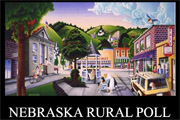Agricultural Economics, Department of

Nebraska Rural Poll
Date of this Version
2011
Document Type
Report
Citation
Center for Applied Rural Innovation, CARI Research Report (September 2011) 11-4, 27 pages
Institute of Agriculture and Natural Resources, University of Nebraska-Lincoln
Also available at https://ruralpoll.unl.edu/pdf/11wellbeing.pdf
Abstract
Most rural Nebraskans are positive about their current situation. And, they continue to be generally positive about their future situation. Over one-half (52%) of rural Nebraskans think they are better off than they were five years ago and just under one-half (45%) think they will be better off ten years from now.
Certain groups remain pessimistic about their situation. Persons with lower household incomes, older persons, persons with lower educational levels and persons who are divorced or separated are the groups most likely to be pessimistic about the present and the future.
When asked if they believe people are powerless to control their own lives, most rural Nebraskans disagree. The proportion that either strongly disagree or disagree with this statement sharply increased from last year.
Rural Nebraskans continue to be most satisfied with family, spirituality, friends, and the outdoors. On the other hand, they continue to be less satisfied with job opportunities, their current income level, and financial security during retirement. However, many of these latter items saw increases in their satisfaction levels this year as compared to last year. However, satisfaction with job opportunities decreased.
Most rural Nebraskans say they are very happy or fairly happy. Persons living in the Southeast region, persons with higher household incomes, married persons and persons with higher education levels are the groups most likely to report being very happy.
Most rural Nebraskans rate themselves as entrepreneurial. Persons living in or near smaller communities, persons with higher household incomes, younger persons, persons with occupations in agriculture, males, persons who have never married and persons with higher education levels are the groups most likely to see themselves as entrepreneurial. In addition, most rural Nebraskans consider themselves a leader in their family and their work/career.
Included in
Agribusiness Commons, Agricultural and Resource Economics Commons, Civic and Community Engagement Commons, Community-Based Research Commons, Demography, Population, and Ecology Commons, Entrepreneurial and Small Business Operations Commons, Place and Environment Commons, Public Affairs, Public Policy and Public Administration Commons, Regional Economics Commons, Rural Sociology Commons

